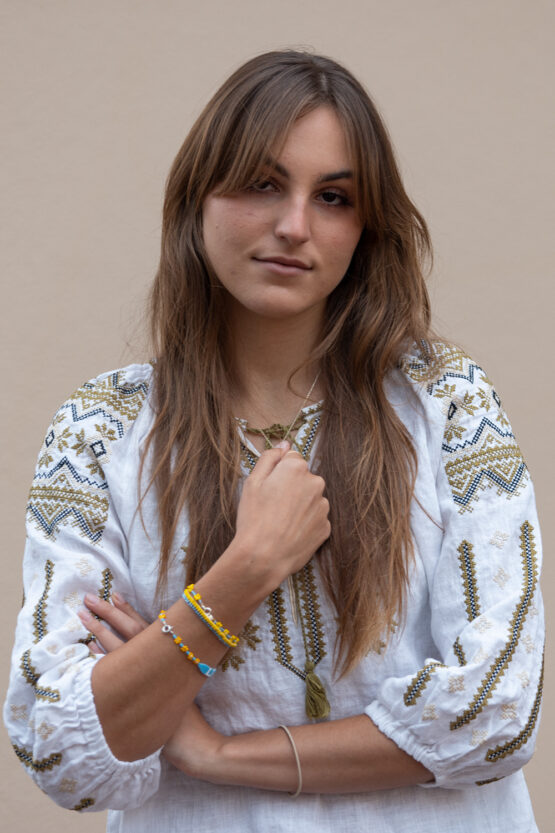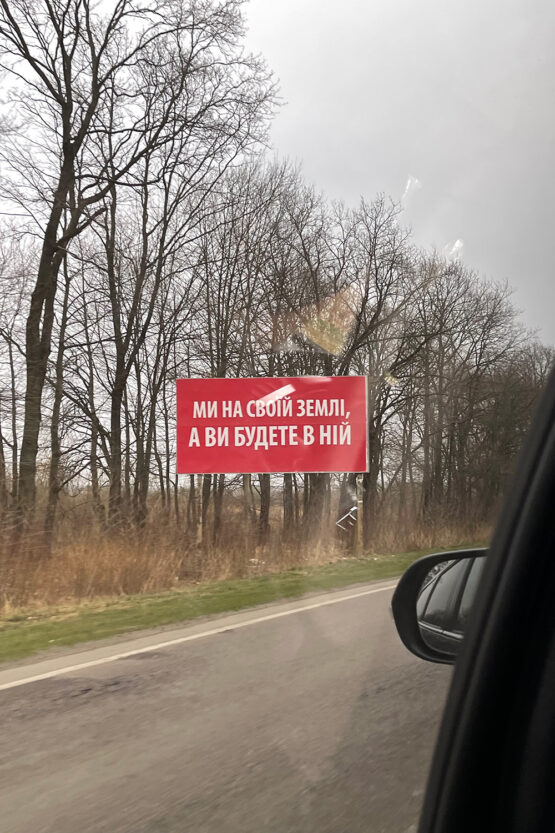Stanford student fights for Ukraine’s history, truth in Russia’s disinformation warfare
After the Feb. 24 invasion of Ukraine by Russian forces, international relations major Catarina Buchatskiy bought a one-way plane ticket to Poland where she has been helping mobilize efforts to protect Ukrainian culture and history from destruction.
Barely a week after Russia invaded Ukraine, Catarina Buchatskiy packed her bags in her Stanford dorm room to go help. As she planned her trip, she wondered how to best prepare for life in a warzone: Would her red backpack make her a target? What shoes would be better for running in, in case she needs to sprint for shelter?

Catarina Buchatskiy has been helping Ukraine protect its cultural heritage from destruction both on the ground and online, where she’s been countering disinformation about Ukrainian history. (Image credit: Andrew Brodhead)
Since March 5, 2022, Buchatskiy, who has taken a leave of absence from her studies, has been crossing from Poland into Lviv in Western Ukraine to mobilize supplies that would help museums and other cultural institutions safeguard Ukrainian heritage from destruction.
Unless protected, Buchatskiy said, Ukrainian identity is in danger of being destroyed. It is especially important to preserve these historical artifacts because Russian President Vladimir Putin pushes a revisionist narrative of the country that sees Ukraine, including its people and culture, not as a separate state with its own unique identity, but as part of Russia. (As Stanford historian Norman Naimark put it, “There is no Russian empire, to which Putin aspires, without Ukraine.”)
“I think it really comes down to a fight over historical narrative,” said Buchatskiy, a sophomore majoring in international relations and international security studies. “Ukraine has this narrative that it is an independent nation trying to forge its own path, whereas Russia believes that Ukraine is an inseparable part of its own history.”
That fight has extended to the internet, where Buchatskiy and colleagues have been working to correct and prevent constant attacks on the digital records of Ukraine’s culture, whether identifying webpages that intentionally use the Russian spelling of the country’s capital, (“Kiev” instead of “Kyiv”) or referring to Ukraine as part of imperial or Soviet Russia – things that might seem like small slights but are common tactics Russians employ to create confusion about the history and independence of Ukraine.
Russia’s information warfare and the fight for history, truth
In 2021, Buchatskiy co-founded The Shadows Project with Agatha Gorski, a history and political philosophy student at Sciences Po in Paris, and Kvitka Perehinets, a history and politics student at the University of Edinburgh, to help protect and promote aspects of Ukrainian culture that Buchatskiy strongly identifies with – her father is Ukrainian and she lived in Kyiv between the ages of 6 and 14. Through the network Buchatskiy built through that project, she was poised to help museums and other cultural institutions protect pieces of Ukraine’s past when the Russian invasion began.

Buchatskiy has helped procure supplies that Ukrainian cultural institutions need to protect important pieces of art and artifacts. Here, the director general of the National Museum in Lviv, is seen bringing in a generator. (Image credit: Courtesy Catarina Buchatskiy)
Since she arrived in Europe, Buchatskiy has helped arrange the procurement of fireproof safes and blankets, generators, and other basic supplies, to help museums, including the Museum of History of Kyiv, and other cultural institutions protect Ukrainian art and artifacts. “I’m very thankful for the chance to be able to preserve the stories of the city that I love so much and that has given so much to me,” she said. “I want to give just a fraction back to it.”
She realized, however, that damage to the physical representations of Ukraine’s culture was not the only risk. Coinciding with the invasion, disinformation about Ukraine, its people, and its history has run rampant online – an issue Buchatskiy helped track in a report for the Stanford Internet Observatory.
For instance, Buchatskiy has been monitoring disinformation on the Wikipedia page for the Ukrainian artist, Kazimir Malevich. Malevich is also a source of national pride for Russia, Buchatskiy said – Russia’s logo for the 2023 World Ice Hockey championship is inspired by Malevich’s style.
Because of Wikipedia’s open-source, collaboration model, anyone can modify an entry on the platform. Buchatskiy said Malevich’s entry has repeatedly been changed to claim him as part of the Russian avant-garde art movement, when in fact he identified as Ukrainian. While the Wikipedia entry currently confirms Ukraine as his birthplace, it doesn’t use the Ukrainian-preferred English standard spelling of the city Malevich was born in – Kyiv – but rather the Russian-rooted version, Kiev.
In recent years, Ukraine has urged the world to use the Ukrainian-preferred English version of the word as a way to distinguish its national identity separate from Russia. This runs counter to Putin’s efforts to revise the country’s past to be part of Russia’s.
“They want to erase any mention of Ukraine and they want to erase Ukraine’s narrative. In their twisted minds, they’re going to win the war, they’re going to be able to erase this. And then within a few generations, they’re going to be able to wipe out Ukraine,” said Buchatskiy, who is also involved in the National Security Affairs Fellows Mentorship Program at Stanford’s Hoover Institution. “If Ukraine doesn’t exist on the internet, did Ukraine ever exist at all? It’s that kind of philosophy. And that’s what they’re trying to do.”
Buchatskiy wonders how many other Wikipedia entries related to Ukrainian cultural heritage have been changed and gone unnoticed. Over the past decade, Russia has built extensive digital operations to sow discord online and has resources that Buchatskiy, who for over six weeks has lived out of a suitcase in either an Airbnb rental or hotel, is unable to match.
“It’s such a frustrating thing, the information war, but that’s exactly why they use it because it puts the burden on every single one of us to counter it when that shouldn’t be the case,” Buchatskiy said. “The burden should be on them. We have the truth on our side, but that’s not enough.”
Life in a warzone
Life has forever changed for Buchatskiy – she said she now can’t look at images of black plastic bags without thinking of the countless body bags seen in images coming out of the Bucha massacre.

Buchatskiy noticed that ads on billboards have been replaced by motivational slogans such as this one that reads “We are ON our land, you’ll be IN it.” (Image credit: Courtesy Catarina Buchatskiy)
Even in the middle of Buchatskiy’s interview for this story, she paused when she saw what she said looked like “a very ominous” text message from her Shadow’s Project co-founder, which read simply “Did you see this.”
It turned out to be about an email the pair had received, but Buchatskiy’s mind immediately went to the worst-case scenario: Was there a nuclear attack?
“Even a very innocent text these days can have a whole different meaning,” Buchatskiy said.
When Buchatskiy has traveled into Ukraine – mostly on her own by train, or occasionally hitching a ride with a truck driver delivering the supplies – she has been struck by how the country has rallied in its fight against Russia. There is no aspect of Ukrainian society untouched by the conflict, she said.
Buchatskiy described how Ukrainian colors – royal blue and bright yellow – line the streets. Ads on billboards are replaced by defiant messages such as “We will win,” “Hold on,” and “You are strong.” On shop windows, there are notices proudly stating that percentages of the store’s proceeds go to the Ukrainian army. In one hotel she stayed at, the television in her room was permanently on because the government needed to constantly broadcast updates about the conflict to its people.
“You really do feel as though you’re in this community that has a purpose, that you exist for something,” Buchatskiy said. She acknowledges that while some may find these daily scenes eerie, for her, they are uplifting. “Everywhere you walk, you’re reminded of what’s happening, and everywhere you walk, you’re inspired and motivated.”
As the war progresses, crossing the border into Ukraine has become challenging for Buchatskiy – the train station she has been using to get to Lviv was bombed, which has made travel difficult. With her travel options increasingly limited, she is reassessing her next steps. Stanford News plans to follow up with Buchatskiy to learn more about what she does next.
